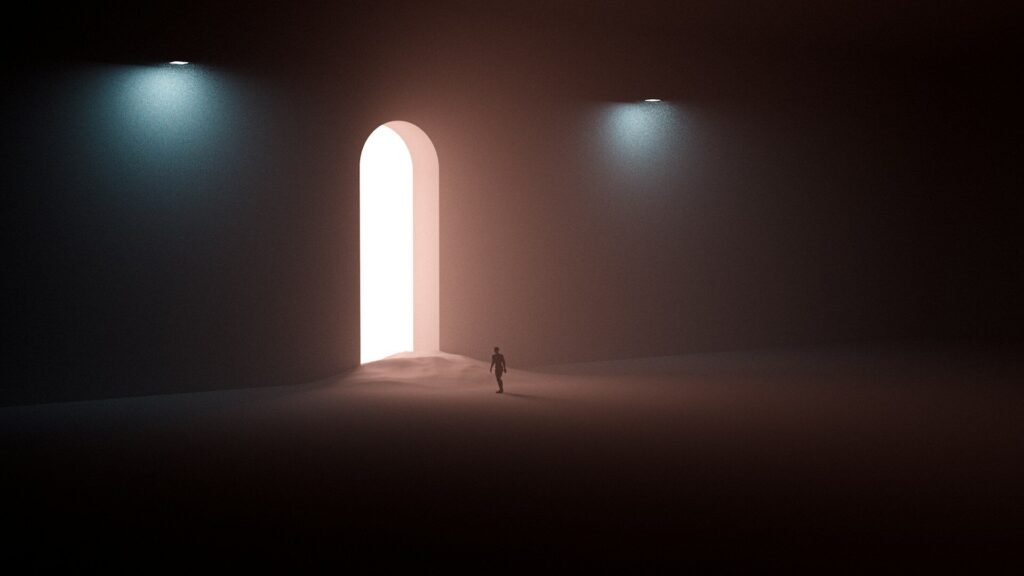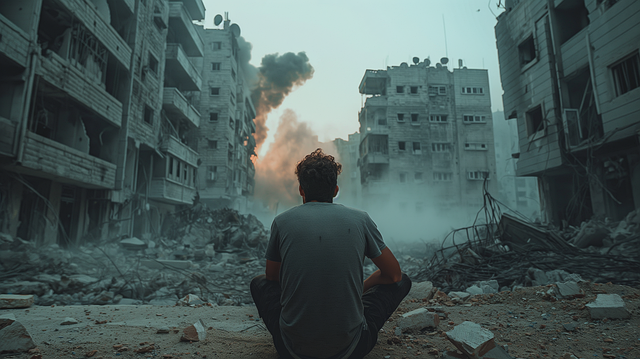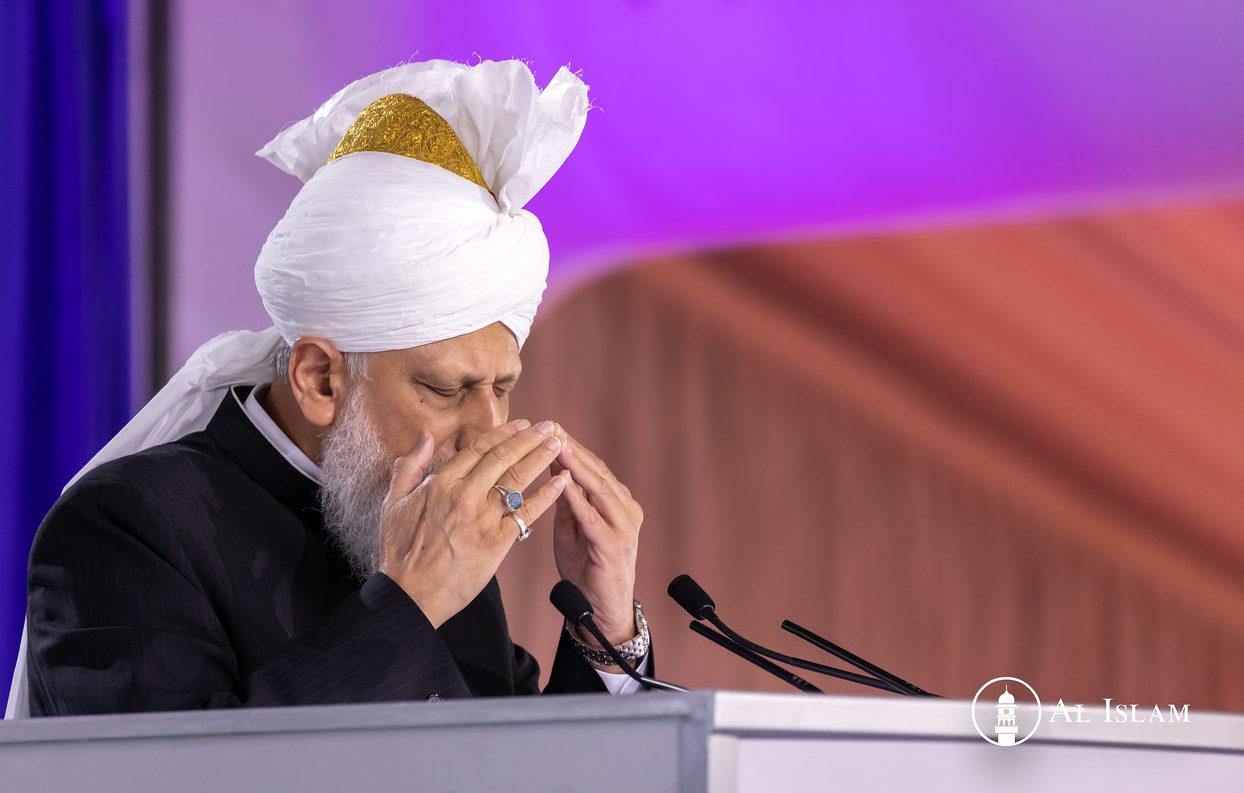Heaven and hell are not material worlds that come from outside but are physical manifestations of man’s spiritual conditions in this world. They arise as the consequences of human actions in this life.
A THARIQ, PALAKKAD
JANUARY 17, 2024
Death, from a materialistic perspective, signifies the end of human existence. But for a believer in God, life does not cease upon death, but is ushered into a new realm of consciousness. This concept of a life after death is present, in one way or the other, in almost all faiths.
Islam constantly reminds man that his earthly life is nothing but a temporary abode, after which he will undergo a spiritual rebirth in a new world where he would be held accountable or rewarded according to the actions he commits in this life.
Nevertheless, numerous misconceptions have become associated with Islam in this regard, with the majority of Muslims having developed the idea of an afterlife that mirrors the present one, where the virtuous will enjoy all sorts of worldly extravagances while the wicked will be condemned to hell to face the torments therein for eternity. Such a concept of the hereafter is alien to Islam and only stems from a rigidly literal interpretation of the relevant Quranic verses.
Before we venture further into this topic, there is a more pressing question that needs to be resolved.
Why does God need heaven and hell?
What is the purpose of afterlife? What role does the creation of heaven and hell play from the perspective of an independent and non-contingent being? Why would a perfect God, devoid of all needs, desire to mete out rewards for the good and punishments for the bad?
These questions are often raised to argue that the concept of afterlife is incompatible with a God of perfect attributes. However, this argument rests on the false assumption that every action must inherently yield some benefit to its doer, which in the case of God would render Him imperfect, as a perfect being should be free from seeking any benefit.
The argument overlooks the fact that God, being perfect, still possesses the right to exercise His choice or will. The creation of heaven, hell, and everything in existence originates solely from this Divine will, without bearing any benefit for God. It was hence His conscious choice to designate a system of test and reward so as to enrich and grant purpose to human life. The Quran says:
“Who has created death and life that He might try you — which of you is best in deeds; and He is the Mighty, the Most Forgiving.”[1]
The World Head of the Ahmadiyya Muslim Community, Hazrat Mirza Masroor Ahmadaba, exposes the absurdity in this argument by drawing a compelling analogy. He says:
“This question is like asking, ‘What benefit does a mother derive from feeding her child or giving bitter medicine when the child is sick?’”[2]
Just as the child alone benefits from the mother’s milk or bitter medicine, likewise, God does not derive any gain or incur any loss in the context of heaven and hell, rather, it is man who emerges as the ultimate beneficiary of this grand system.
The problem of hell
As mentioned, the necessity of heaven and hell arises from the consequences of human actions, both virtuous and otherwise. However, a profound question persists: Why would an Omnibenevolent God create a hell replete with horrors and tormenting punishments?
This question holds merit only if hell were conceived as a place of futile punishment and eternal damnation while Islam does not attribute either of the two characteristics to hell.
The Quran portrays hell not as a place for inflicting pointless torment, but rather as a stage for reformation. It says:
“It is these whose abode is fire.”[3]
The Arabic term ‘ma’wa’ (abode) used in the verse denotes a place of refuge or asylum. While it sounds strange for fire to be described as refuge, in reality, it sheds light on the true nature of Divine punishment. Commenting on the verse, the Second Caliph of the Ahmadiyya Muslim Community asserts that this implies that the purpose of hell is not to torture humans but, rather, to reform them[4]. In the same way that hospitals serve as places for curing physical diseases, hell acts as the abode for the reformation of the spirit. The pain endured in hell is akin to the pain experienced during the process of treatment.
This also dispels the notion of punishment being a process that continues for eternity. As the objective of hell is reformation, a spirit would obviously be delivered from this state once its purpose is achieved. Hence, the Holy Prophetsa is reported to have stated:
“Verily a day would come over hell when there shall not be a single human being in it.”[5]
Thus, the merciful nature of God transcends the consequences of misdeeds, offering wrongdoers a chance for redemption. Hell becomes a place of painful but transformative purification, paving the way for eventual ascension to heaven.
The imagined paradise
A prevalent belief among Muslims is that paradise is akin to a serene meadow covered by shadows, with rivers and streams flowing with milk, honey, and wine. Here, it is believed that individuals will receive whatever they desire at the mere thought. The most virtuous will be rewarded with multiple spouses, and heaven would provide for them all provisions for extravagant experience.
However, this interpretation of paradise does not bring favourable news for virtuous women. Despite their righteous deeds, they would find themselves among the numerous spouses of men who lead indulgent and intoxicated lives in this paradise.
All these problems arise from an understanding that is grounded in a literal interpretation of the relevant verses of the Quran. But the fact is that the Holy Quran emphasises that heaven and hell are beyond human comprehension. Hence it states that God would raise man into a form of which he has not the slightest of knowledge[6].
Similarly, the Holy Prophetsa is reported to have said:
“Allah says: ‘I have prepared for My righteous servants that which no eye has seen, no ear has heard and has never crossed the mind of any human being.’”[7]
This forms the ground for an accurate understanding of the Islamic concept of afterlife, leaving no room for the literal interpretation of the rewards of the paradise mentioned in the Quran and narrations.
Yet another narration of the Holy Prophetsa further substantiates the view that heaven and hell are not material locations in the sense of this physical universe. The Holy Prophetsa was once asked where the hell was situated given the fact that the Quran describes the expanse of paradise as encompassing the space of the entire universe[8]. The Prophetsa replied, “where is the night when the day dawns”[9], clearly implying that their coexistence is beyond human comprehension as they belong to otherworldly dimensions unknown to man.
Therefore, it is erroneous to presume that the pleasures of paradise mimic the physical pleasures of this world. These realms transcend earthly experiences, with spiritual delights, far surpassing worldly pleasures, such that they cannot be experienced through the limited faculties of man’s earthly existence.
The true understanding of the afterlife
According to Islam, the hereafter is a world that arises as the consequence of human actions in this life. Heaven and hell, as per this understanding, are not new material worlds that come from outside but are physical manifestations of man’s spiritual conditions in this world. Hazrat Mirza Ghulam Ahmadas, the Founder of the Ahmadiyya Muslim Community and the Promised Messiahas, has expounded on this topic in great detail. He says:
“According to the Holy Quran, hell and heaven are both reflections of a man’s life, and are not something new that comes from outside. It is true that in the Hereafter they will be manifested physically, but they will be reflections of the spiritual conditions of man in this life. We do not conceive of heaven as containing material trees, nor of hell as full of brimstone and Sulphur. According to Islamic teachings heaven and hell are the reflections of the actions that a person carries out in this world.”[10]
Expanding upon this viewpoint and delving into the description of the delights and punishments of paradise and hell, the Fourth Caliph of the Ahmadiyya Muslim Community, Hazrat Mirza Tahir Ahmadrh, says:
“If a man is almost dying of thirst but is otherwise healthy, cool water can provide him such deeply satisfying pleasure as cannot be derived from the ordinary experience of drinking water, or even the most delicious drink of his choice. If a man is thirsty and hungry as well, and he needs an immediate source of energy, a chilled bunch of grapes can provide him with such deep satisfaction as is not experienced by the same in ordinary circumstances. But the pre-requisite for these pleasures is good health. Now visualise a very sick man, who is nauseating and trying to vomit whatever liquid is left in him and is on the verge of death through dehydration. Offer him a glass of cool water, or a chilled bunch of grapes, then not to mention his accepting them, a mere glance of them would create a state of revulsion and absolute abhorrence in him.”[11]
Hazrat Mirza Tahir Ahmadrh then draws a parallel between the described situation and the experience of heaven. He asserts that a healthy soul, having cultivated a taste for virtuous pursuits, would derive heightened pleasure in close proximity to the objects of its choice. In heaven, such a spiritually healthy soul would perceive, conceive, and feel the nearness of God’s attributes in an unparalleled and profound manner compared to what it has experienced before.[12]
Similarly, an unhealthy soul would give rise to an unfavourable state in the hereafter. The very factors that bring pleasure to a spiritually healthy soul would, in turn, inflict torment and profound suffering upon this unhealthy entity.[13]
The sequence of these experiences initiates immediately following an individual’s death. The soul perseveres in its evolution, commencing directly from the grave. Those who have transgressed in their earthly life will undergo purification in the realm of hell, gradually advancing towards heaven. The state of hell will eventually cease to exist. Each person, brought into existence from nothingness, will ultimately be reunited with their Creator.
The author holds a master’s degree in physics from Chandigarh University.
END NOTES
[1] Holy Quran 67:3
[2] Why Does God Need Heaven and Hell?, Answer to Everyday Issues – Part XIX, Al Hakam 30 July 2021
[3] Holy Quran 10:9
[4] Tafsir-e-Kabir (The Grand Exegesis) v. 2 p. 45 (2023 edition)
[5] Tafsir al-Baghawi, v. 4 p. 202, (under the verse 11:108)
[6] Holy Quran 56:62
[7] Sahih al-Bukhari, Kitab at-Tawheed (Book on the Oneness of God)
[8] Holy Quran 3:134
[9] Tafsir al-Tabari v. 6 p. 54 under the verse 3:133
[10] The Philosophy of the Teachings of Islam p. 157
[11] An Elementary Study of Islam, pp. 51-52
[12] Ibid p. 52
[13] Ibid












2 Comments
M.A ZAINUL ABIDEEN · January 17, 2024 at 3:28 pm
Translate to various languages
K Muhammad Salim · January 17, 2024 at 5:06 pm
Masha Allah supper